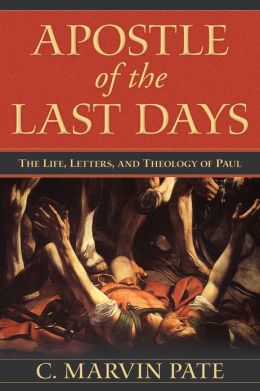 Dr. C. Marvin Pate has written an excellent volume on the theology of the Apostle Paul. It is titled, Apostle of the Last Days. Kregel sent me a review copy, and it is already one of the best books I have read in the past year.
Dr. C. Marvin Pate has written an excellent volume on the theology of the Apostle Paul. It is titled, Apostle of the Last Days. Kregel sent me a review copy, and it is already one of the best books I have read in the past year.
Apostle of the Last Days
I had Dr. Pate as a professor when I was a student at Moody Bible Institute, and really enjoyed his insights into Scripture, his wit, and his quirky personality. I only took him for one or two classes, but consider him to be one of my influential professors from college. He challenged me to really consider the historical and cultural background material of Scripture.
Grammar and word studies are nice, but if you don’t know the history and culture behind a biblical book or passage, you will never really understand what Scripture teaches.
This book by Dr. Pate provides excellent historical and cultural background into the life, thinking, and theology of the Apostle Paul. Though I have not yet read N. T. Wright’s Paul and the Faithfulness of God, this volume on Paul’s theology is by far one of the best on this topic I have found.
Apostle of the Last Days challenged me to read Paul’s letters not just in light of the history and culture of Judaism, but also in the history and culture of Graeco-Roman thinking, and most importantly of all, in light of the eschatological expectations of both groups.
Eh… what?
Let me put it in simple terms:
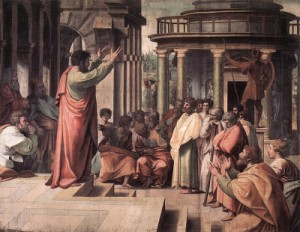 Both the Jews and the Romans had hopes and dreams for what would happen at the end of days. Pate shows that Paul wrote to reveal how Jesus fulfills and completes these hopes and dreams.
Both the Jews and the Romans had hopes and dreams for what would happen at the end of days. Pate shows that Paul wrote to reveal how Jesus fulfills and completes these hopes and dreams.
Summary of Apostle of the Last Days
After a chapter of introduction about the views on the theology of Paul and some of the central tenants of Pauline theology, Pate goes letter by letter through the writings of Paul to show how Paul tied together Jewish and Graeco-Roman hopes about what would happen at the end of days, and shows how these hopes were fulfilled in Jesus Christ and the Kingdom of God.
Serious students of Pauline theology must not overlook this important volume by C. Martin Pate. Pate is on to something about Paul’s thinking and theology that is often missed by Pauline scholars: Paul is not only writing a response to Jewish theology, but is also writing a response to Greek and Roman theology, and especially the Imperial Cult of Caesar worship.
It could probably be said that the letters of Paul are not only intended to show how Jesus fulfills the Old Testament prophecies about the Messiah, but how Jesus also fulfills the Graeco-Roman expectations for what Caesar was supposed to be and do.
This is a challenging idea on multiple levels, and if true, the ramifications are far-reaching. As such, Apostle of the Last Days is a critically important book for thinking about Pauline theology and teaching. If you are preaching or teaching on any letter of Paul, I highly recommend this volume. You can get Apostle of the Last Days at Amazon.
I liked this book by C. Marvin Pate so much, it inspired a book idea of my own which I really want to write. First, however, I have to finish with the five books I am already writing… sigh…




 Here is
Here is  Here are the lyrics:
Here are the lyrics:
 By looking at the ways the two symbols are used in Scripture, it seems that “The Book of the Living” is a way of referring to all people who are alive. So when a person is born, they are in the Book of the Living, and when they die, their name is removed or blotted out from this book (cf. Ps 69:28).
By looking at the ways the two symbols are used in Scripture, it seems that “The Book of the Living” is a way of referring to all people who are alive. So when a person is born, they are in the Book of the Living, and when they die, their name is removed or blotted out from this book (cf. Ps 69:28). This is an example of litotes. You have stated something positive — that Kansas City will sin — in a negative way: they will certainly not lose. The reason we use litotes is because it helps emphasize the positive thing we are trying to say. In the Kansas City – Jacksonville example, the use of litotes tells us that not only will Kansas City win, but the game will probably be a blowout.
This is an example of litotes. You have stated something positive — that Kansas City will sin — in a negative way: they will certainly not lose. The reason we use litotes is because it helps emphasize the positive thing we are trying to say. In the Kansas City – Jacksonville example, the use of litotes tells us that not only will Kansas City win, but the game will probably be a blowout. In John 3:5, when Jesus that those who overcome will not be blotted out of the book of life, He is using litotes. If you read through Revelation 2-3, Jesus is pronouncing warnings and blessings to the various churches of Asia Minor, and all the blessings are for those people who overcome.
In John 3:5, when Jesus that those who overcome will not be blotted out of the book of life, He is using litotes. If you read through Revelation 2-3, Jesus is pronouncing warnings and blessings to the various churches of Asia Minor, and all the blessings are for those people who overcome.
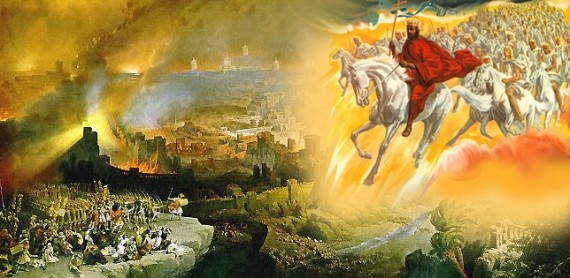
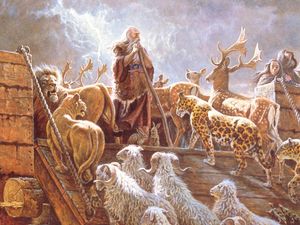 What is this attitude? What is the failure? It is living life as if nothing else matters beyond this life. It is when people fill their lives with some of the blessings of life—such as eating, drinking, and marrying—so that they ignore the signs of the times in which they live and the testimony from God about what is coming unless they all heeded the warnings and followed the ways of God (Matthew 24:32-33).
What is this attitude? What is the failure? It is living life as if nothing else matters beyond this life. It is when people fill their lives with some of the blessings of life—such as eating, drinking, and marrying—so that they ignore the signs of the times in which they live and the testimony from God about what is coming unless they all heeded the warnings and followed the ways of God (Matthew 24:32-33). The fire of God is like the fire of the sun. Just as all the oceans of the world would do no more to quench the fires of the sun any more than would a single drop of water, so also, all the sins of all the people of all the world can do no more to quench the inferno of God’s holiness than would a single unkind thought from one person. Sin cannot taint God, for all sin is incinerated by the fire of God’s love, holiness, righteousness, and glory.
The fire of God is like the fire of the sun. Just as all the oceans of the world would do no more to quench the fires of the sun any more than would a single drop of water, so also, all the sins of all the people of all the world can do no more to quench the inferno of God’s holiness than would a single unkind thought from one person. Sin cannot taint God, for all sin is incinerated by the fire of God’s love, holiness, righteousness, and glory. How can a God who says "Love your enemies" (Matthew 5:44) be the same God who instructs His people in the Old Testament to kill their enemies?
How can a God who says "Love your enemies" (Matthew 5:44) be the same God who instructs His people in the Old Testament to kill their enemies?

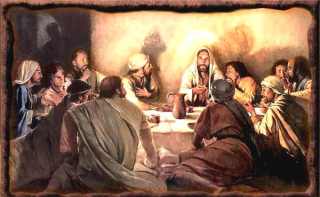 John 14:2 is part of the Upper Room Discourse, and is usually understood to mean that Jesus is going to go back to heaven, where He will be at work to prepare mansions or dwelling places for the church, and when He is done, He will come back and take us to live with Him forever.
John 14:2 is part of the Upper Room Discourse, and is usually understood to mean that Jesus is going to go back to heaven, where He will be at work to prepare mansions or dwelling places for the church, and when He is done, He will come back and take us to live with Him forever.

